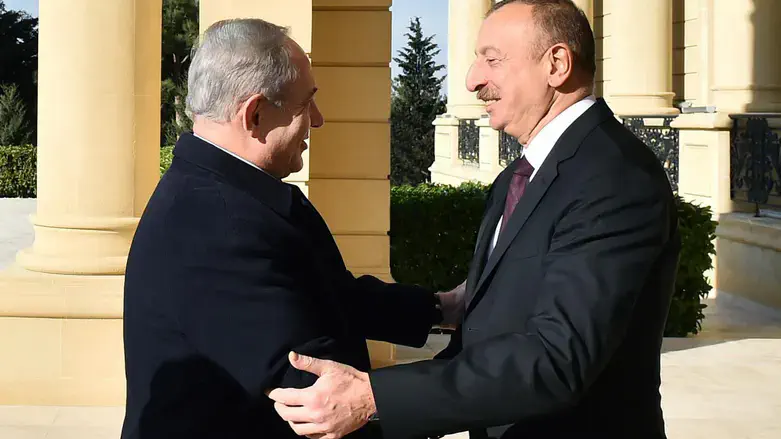
A newly-released Israeli Foreign Ministry report outlines the growing strategic partnership between Israel and Azerbaijan, emphasizing economic cooperation, diplomatic ties, and Azerbaijan’s exceptional support for its Jewish community.
Despite being a Shiite Muslim-majority country, Azerbaijan has maintained warm relations with Israel for years, strengthening cooperation across various fields, including energy, security, and trade. Foreign Minister Gideon Saar noted that this partnership, built on shared strategic interests and open dialogue, is expected to deepen further and could serve as a model for other Muslim nations.
The report highlights Azerbaijan’s long-standing Jewish community as a significant factor in relations between the two countries. One of the world’s oldest Jewish communities, Azerbaijani Jews have historically enjoyed full religious freedom and government support. According to the report, Azerbaijani Jews "have never experienced antisemitism," an assertion that underscores the country’s unique religious tolerance. In the city of Quba, home to the historic "Red Village" — one of the world's only all-Jewish settlements — Jewish institutions, synagogues, and cultural organizations operate with full government backing. Meanwhile, in Israel, a sizable Azerbaijani-origin community of approximately 70,000 people serves as a cultural and economic bridge between the two nations.
One of the defining aspects of Israel-Azerbaijan relations is the country’s proactive approach to religious freedom. Unlike many other Muslim-majority nations, Azerbaijan guarantees complete freedom of worship for all religious minorities, including Jews and Christians. The country is also the first in the Muslim world to incorporate education on antisemitism into its school curriculum, according to an IMPACT-SE report. Additionally, the Azerbaijani government actively preserves synagogues and churches as part of its broader commitment to protecting the religious heritage of all citizens.
Beyond diplomatic and cultural ties, Israel and Azerbaijan maintain strong economic relations, particularly in the energy sector. Azerbaijan is long-time Israel’s key supplier of oil needs, which makes it a crucial player in Israel’s energy security, particularly amid fluctuating global markets. Economic collaboration extends to other sectors as well, including agriculture, cybersecurity, space, water management, and advanced industry, with Israeli and Azerbaijani companies engaging in joint strategic initiatives. The Israeli Embassy in Baku plays an active role in fostering these economic ties, facilitating business connections and investment opportunities between the two nations.
Diplomatic relations between Israel and Azerbaijan continue to gain momentum. Over the past year, high-level meetings have taken place between foreign ministers, alongside official visits by Israeli ministers to Baku and Azerbaijani officials to Jerusalem. President Isaac Herzog and Israel’s Defense Minister also visited Azerbaijan, underscoring the strategic significance of the relationship. The ongoing diplomatic dialogue includes security and innovation partnerships, further solidifying Azerbaijan’s role as a stable and valuable regional ally for Israel.
Israel’s relationship with Azerbaijan demonstrates that a partnership between a Jewish state and a Muslim-majority country is not only possible but also highly beneficial for both sides. While many Muslim nations remain distant from Israel, Azerbaijan offers an alternative model — one based on shared economic and strategic interests, religious tolerance, and mutual respect. As Israel continues expanding its ties with moderate Muslim countries, Azerbaijan stands as a key example of how cooperation can bridge religious and geopolitical divides. With growing regional challenges and mutual economic opportunities, the alliance between Israel and Azerbaijan is poised to strengthen even further in the coming years.
Recently a number of prominent rabbis with extensive diplomatic backgrounds sent letters to US President Donald Trump regarding the possible inclusion of Azerbaijan in the Abraham Accords framework.
The group is led by Rabbi Marvin Hier, founder of the Simon Wiesenthal Center, and Rabbi Eli Abadi, a senior rabbi in the UAE and personal friend of Jared Kushner, Trump's son-in-law and architect of the Abraham Accords.
Among the high-profile signatories is Rabbi Aryeh Ralbag, head of the rabbinical court of the Rabbinical Alliance of America and Canada, which includes approximately two hundred ultra-Orthodox rabbis and the organization of Zionist rabbis.
In their letters, the rabbis emphasized a significant point: countries that joined the Abraham Accords received extensive incentives and political backing from the United States. Azerbaijan, on the other hand - described as the most reliable Muslim country as a strategic partner of Israel and a key US ally in the Middle East for three decades - has not received American support. Moreover, it remains under sanctions restrictions from Washington through Section 907, which limits American aid to the country, despite its long-standing contribution to regional security.

